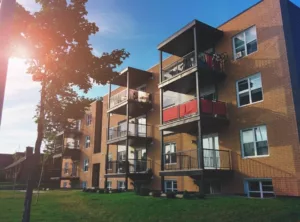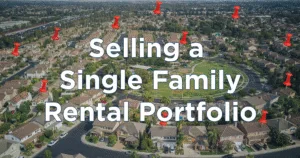If you spend any time talking to a broad group of real estate investors, one thing will become clear: there truly is no “one size fits all”.
The path to real estate success can be hugely varied, and what is a dream property for one investor can be a total nightmare for the next.
I have a friend who is an industrial redeveloper in the San Francisco Bay Area. There, they can count on environmental remediation of every property they purchase, because the tidal currents move water tables underneath the overall land mass. This moving water table shifts contaminants common in many older, industrial properties to all of the surrounding ones, creating a common and expected problem. My friend loves taking on these challenging properties that many investors would never touch.
Today, we are reviewing a unique property type that may be a fit for some investors – zero cash flow NNN investments.
A zero cash flow (Zero CF), triple net (NNN) investment, is a niche but intriguing option for seasoned investors seeking tax benefits, passive income, and stable long-term returns.
Understanding a Zero Cash Flow NNN Investment
Triple Net (NNN) Lease Basics
A triple net (NNN) lease is a lease agreement where the tenant is responsible for paying the property’s operating expenses, including real estate taxes, insurance, and maintenance, in addition to their rent. This arrangement minimizes the landlord’s responsibilities, making it a popular choice for investors seeking passive income.
Zero Cash Flow (Zero CF) Basics
Zero cash flow properties are highly leveraged NNN investments where the rental income from the property exactly matches the debt service (loan payments), resulting in zero net cash flow to the investor during the loan term. Typically, these properties are leased to creditworthy tenants with long-term (15-25 ear) leases, ensuring stable and predictable income to cover the debt.
Benefits of Zero Cash Flow NNN Investments
Tax Advantages
- Depreciation: Investors can depreciate the property, reducing taxable income
- Interest Deductions: The interest component of the debt service is tax-deductible, providing significant tax relief.
Zero CF properties provide a source of depreciation and interest expenses that an owner can use to offset income received from other qualifying investment properties, thus lowering the owner’s overall tax obligation. These benefits are generally available within the first 10-15 years of ownership.
Long-Term Leases
These properties feature long-term leases (15-25 years), providing stability and predictability.
Opportunity in a Tough Market
Securing financing during volatile markets can be difficult as the risk goes up. Acquiring a zero cash flow NNN investment property negates the financing issues by requiring a small percentage down payment compared to a traditional commercial transaction because a secure tenant backs the loan.
Equity Buildup/Debt Amortization
As the tenant pays down the mortgage over time, the investor builds equity in the property, which can be substantial by the end of the long term.
Risks and Considerations
Lack of Immediate Cash Flow
Zero net income means that investors receive no net cash flow during the loan term. This may be a drawback for those needing immediate income. The investor should have a reserve for loan payments in case of an unlikely default, or a repeat of COVID-era lockdowns.
Tenant Credit Risk
The investment’s success heavily relies on the tenant’s ability to meet lease obligations. Tenant default can lead to financial challenges for investors. This lease structure was common with many drugstores and the recent struggles of large tenants like Rite Aid highlight the importance of these considerations.
Tricky Taxes
The biggest benefit to a zero cash flow NNN investment deal is the tax break, but it can also be the most challenging part of owning this type of facility. Typically, 10 to 15 years into the investment, the annual depreciation will fall below the yearly lease payments, making the investment appear profitable. This situation is called phantom income, income that is taxable but not actually received and can often cancel out the tax benefits that the zero cash flow once boasted. Investors must have cash flow available, or other passive deductions in later years, to balance out this tax obligation since the the property will not provide cash flow.
Zero Cash Flow NNN Investments Are Best Suited For:
1031 Buyers
Zero cash flow NNN investments are most attractive for 1031 exchange buyers that need to replace their investment but have little to no equity. This investment strategy can replace a large amount of debt in a tight timeline without the start-up costs.
1031 exchange buyers with equity may also consider acquiring a zero cash flow NNN investment, as it will allow them to cash in on the paydown readvance that they get from the loan and receive a significant amount of tax-free equity.
Paydown Readvance
Perhaps the biggest benefit for investors in zero cash flow NNN investment properties is the paydown readvance feature. The paydown feature allows the borrower to pay the balance of the loan down in full at any point during the term of the loan. If a borrower elects to use the paydown feature, the readvance then allows the borrower to instruct the lender to refinance the loan back to the balance and terms it was at prior to the paydown.
If the property is part of a 1031 exchange, the buyer can exercise this option to purchase the property while fulfilling the debt and equity requirements of their exchange, and later pull out some of their equity tax-free. Let’s say that an owner just sold their property for $30,000,000, of which there was $25M in equity and $5M in debt obligations. The owner finds a zero cash flow property that they want to purchase for $30M, using $3M as equity and assuming $27M in debt, thus covering their debt requirement. To meet their equity requirement, the owner decides to apply all $25M in cash to purchase the zero cash flow property.
Before closing, the owner notifies the lender that they want to use the Paydown Readvance feature. The owner then puts down $25M cash towards to purchase of the property, paying the loan down to only $5M. After closing, the debt is readvanced to the original $27M and the owner pulls out $22M in tax-free proceeds.
Conclusion
Zero cash flow NNN investment real estate offers a unique blend of stability, tax advantages, and passive income, appealing to specific investor profiles. Investors considering this strategy should conduct thorough due diligence and consult with financial advisors to ensure alignment with their financial goals and risk tolerance.
Looking to diversify your investments? We can help connect you with professionals who specialize in unique assets in any state in the U.S. Call us today for a confidential consultation!
Videos
Check out Naomi’s video about zero cash flow NNN investment properties!
For more information about this type of property development, check out our video on build-to-suit properties!






